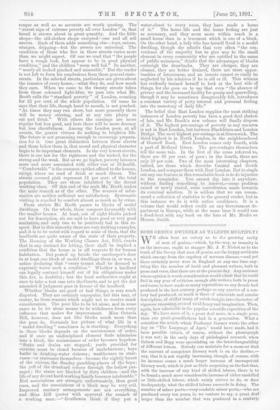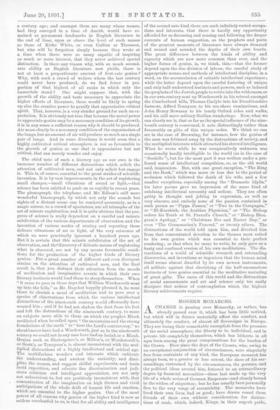DOES GENIUS DWINDLE AS TALENTS MULTIPLY?
WE often hear an outcry as to the growing rarity of men of genius,—which, by-the-way, as insanity is on the increase, ought to stagger Mr. J. F. Nisbet as to the truth of his theory that men of genius are the happy accidents which emerge from the caprices of nervous disease,—and yet there certainly never were in England at any one time any- thing like the number of lucid and pleasant writers, both in prose and verse, that there are at the present day. Any reviewer whose opinion is worth consideration would admit that he could find in any year of criticism enough able writers, both in prose and verse, to have made as many reputations as any decade had produced in the last century, perhaps as any quarter of a Cen- tury had produced, so much is there of admirable and concise description, of skilful irony, of subtle insight into character, of vigorous reasoning, even of vivid fancy and imagination. Then, again, bow admirable is the popular scientific exposition of the day. We have more of it, a great deal more, in a single year, than our great-grandfathers had in a generation. What a sensation the article which Professor Garner wrote the other day on "The Language of Apes," would have made, had it been possible (which, of course, without the phonograph it was not) in the early days of philological research, when Grimm and Bopp were speculating on the interchangeability of different letters. Nobody can maintain for a moment that the amount of competent literary work is on the decline,— nay, that it is not rapidly increasing, though, of course, with its increase cornea a much larger increase of incompetent literary work, which is just as little surprising as the fact that, with the increase of any kind Of skilled labour, there is to be found a much more considerable increase of either unskilled or little-skilled labour, which vainly strives to do, or does inadequately, what the skilled labour succeeds in doing. The number of minor poets,—very readable minor poets,—who are produced every ten years, is, we venture to say, a great deal larger than the number that was produced in a century,
a century ago; and amongst them are many whose names, had they emerged in a time of dearth, would have re- mained as permanent landmarks in English literature to the end of time, upon or above the level of such names as those of Kirke White, or even Collins or Thomson, but who will be forgotten simply because they wrote at a time when there were so many capable of inspiring as much or more interest, that they never achieved special distinction. Is there any reason why, with so much second- rate ability as English literature now yields, there is not at least a proportionate amount of first-rate genius ? Why, with such a crowd of writers whom the last century could never have produced, do we find fewer in pro- portion of that highest of all ranks in which only the immortals stand P One might suppose that, with the growth of the ability and taste necessary to appreciate the higher efforts of literature, there would be likely to spring up also the creative power to gratify that appreciative critical spirit. That, however, is a very slender ground for such an ex- pectation. It is obviously not true that because the moral power to appreciate genius may be a necessary condition of its growth, it is in any sense a sufficient reason why it should be produced. Air must clearly be a necessary condition of the organisation of the lungs, but no amount of air will produce so much as a single pair of lungs. And in some directions it would seem that a highly cultivated critical atmosphere is not as favourable to the growth of genius as one that is appreciative but not critical, that can merely wonder and enjoy.
The chief note of such a literary ago as our own is the immense number of different distractions which solicit the attention of cultivated men, and not only solicit but engage it. This is, of course, essential to the great strides of scientific invention. It is by vast improvements in the art of registering small changes,—small vibrations of sound or light,—that science has been en'abled to push on so rapidly in recent years. The phonograph, the telephone, and Mr. Edison's still more wonderful kineto graph, by which not only the sounds but sights of a distant scene can be rendered accurately, as in a magic mirror, to a crowd of spectators, are all triumphs of the art of minute registration, and it is quite obvious that the pro- gress of science is really dependent on a careful and minute subdivision of the various departments of observation and the invention of various modes of storing and repeating those delicate vibrations of air or light, of the very existence of which we were practically ignorant a hundred years ago. But it is certain that this minute subdivision of the art of observation, and thediscovery of delicate means of registering what is observed, are not by any means favourable condi- tions for the production of the higher kinds of literary genius. Put a great number of . different and even divergent strains on the attention of cultivated men, and the final result is, that you distract their attention from the moods of meditation and imaginative reverie in which their own literary instincts would lead them to steep themselves. When "it came to pass in those days that William Wordsworth went up into the hills," as Mr. Bagehot happily phrased it, he went there to cherish a mood of meditation and to pore over a species of observations from which the various intellectual distractions of the nineteenth century would effectually have weaned him ; and if he had not shaken the dust from his feet and left the distractions of the nineteenth century, to muse on subjects more akin to those on which the prophet Miceli meditated when he called upon "the mountains and the strong foundations of the earth" to" hear the Lord's controversy," we should never have bad a Wordsworth, just as in the nineteenth century we could not in any case have had an Isaiah or a Micah. Genius such as Shakespeare's, or Milton's, or Wordsworth's, or Scott's, or Tennyson's, is almost inconsistent with the mul- tiplied distractions of a highly intellectual and critical age. The multifarious wonders and interests which cultivate the understanding, and awaken the curiosity; and disci- pline the reason, and suggest skilful experiments, and train lucid exposition, and educate fine discrimination and judi- cious criticism and intelligent appreciation, are not only not subservient to, but are positively inconsistent with, that concentration of the imagination on high themes and vivid anticipations of the whole drift of human life and emotion, which are essential to the higher genius. One of the most potent of all reasons why genius of the higher kind is now so seldom vouchsafed to us, is that for all ability and intelligence
of the second-rate kind there are such infinitely varied occupa- tions and interests, that there is hardly any opportunity afforded for so dreaming and musing and following the deeper currents of human suggestion, as the prophets and poets of the greatest moments of literature have always dreamed and mused and sounded the depths of their own hearts. The great difference between the kinds of ability and capacity which are now more common than ever, and the higher forms of genius, is, we think, this,—that the former depend upon the due division of labour, the careful study of appropriate means and methods of intellectual discipline, in a, word, on the accumulation of suitable intellectual experience ; while the latter depend upon the careful fostering of unique and only half-understood instincts and powers, such as induced the prophets of the Jewish people to retire into the wilderness, or in our own century sent up Wordsworth to his retreat amongst the Cumberland hills, Thomas Carlyle into his Dumfriesshire fastness, Alfred Tennyson to his sea-shore ruminations, and John Henry Newman to his lonely Oxford rides and walks, and his still more solitary Sicilian wanderings. Now, what we can clearly see is, that so far as the special influence of the nine- teenth century is concerned, it acts distractingly rather than favourably on gifts of this unique order. We think we can see in the case of Browning, for instance, how the genius of the man was frittered away by the distractions of society, and the multiplied interests which attracted his shrewd intelligence. What he wrote while he was comparatively unknown was occasionally hardly intelligible to the world (as in the case of " Sordello "), but for the most part it was written under a pro- found sense of intellectual compulsion, or, as the old world said, inspiration. But, with one great exception, "The Ring and the Book," which was more or loss due to the period of seclusion which followed the death of his wife, and a few smaller exceptions, especially among the "Dramatic Idylls," his later poems gave no impression of the same kind of subduing intellectual necessity and ardour. They are often gritty in thought and jolting in expression, as well as very obscure, and embody none of the passion contained in such poems as " Pippa Passes," or "Two in the Campagna,"- or " El-Karshish, the Arabian Physician," or "The Bishop orders his Tomb at St. Praxed's Church," or "Bishop Blon- gram's Apology," or "Christmas Eve and Easter Day," or even "The Grammarian's Funeral," or twenty others. The distractions of the world told upon him, and diverted him from that concentrated devotion to the themes most suited to his own genius which was essential to their perfect rendering; so that when he came to write, he only gave us a hasty and confused version of his own meditations. The dis- tractions of a world of scientific research and astounding discoveries, and inventions so ingenious that the human mind itself seems almost dwarfed by its own newest instruments, all militate against that cherishing of the half-unconscioua instincts of true genius essential to the meditative maturing of great gifts. The cares of this world and the distractions of social amusements and art and science only too easily dissipate that ardour of contemplation which the highest literary achievements require.



































 Previous page
Previous page